Anti-austerity movement in Spain: Difference between revisions
Tygerpencil (talk | contribs) |
Tygerpencil (talk | contribs) |
||
| Line 137: | Line 137: | ||
===June=== |
===June=== |
||
===2 June=== |
====2 June==== |
||
At least 40 people gathered in [[Montcada i Reixac]], Barcelona and prevented court officials from serving a family with the order to leave their home immediately, and protesting against banks repossessing people's homes.<ref>{{cite news|title=Aplazan el segundo intento de desahuciar a una familia|url=http://www.elmundo.es/elmundo/2011/06/02/barcelona/1307036610.html|accessdate=14 July 2011|newspaper=El Mundo}}</ref> |
At least 40 people gathered in [[Montcada i Reixac]], Barcelona and prevented court officials from serving a family with the order to leave their home immediately, and protesting against banks repossessing people's homes.<ref>{{cite news|title=Aplazan el segundo intento de desahuciar a una familia|url=http://www.elmundo.es/elmundo/2011/06/02/barcelona/1307036610.html|accessdate=14 July 2011|newspaper=El Mundo}}</ref> |
||
===4 June=== |
===4 June=== |
||
Revision as of 22:26, 14 July 2011
| 2011 Spanish protests | |
|---|---|
| Part of the impact of the Arab Spring and the European sovereign debt crisis | |
 The Puerta del Sol square in Madrid became a focal point and a symbol during the protests. In the picture, on 20 May. | |
| Date | May 15, 2011 — ongoing |
| Location | |
| Caused by | Unemployment, economic conditions, welfare cuts, political corruption, particracy, excluding bipartidism |
| Goals | Upgrade democracy,[vague] reduce influence of economic powers in politics |
| Methods | Demonstrations, civil disobedience, civil resistance, sit-ins, online activism, protest camps occupations |
| Status | Ongoing |
| Casualties | |
| Injuries | over 280 |
The 2011 Spanish protests, also referred to as the 15-M Movement[1] or the Spanish revolution[2], are a series of ongoing demonstrations in Spain whose origin can be traced to social networks and Real democracy NOW (Spanish: Democracia real YA) among other civilian digital platforms and 200 other small associations.[3] Compared with the Arab Spring and May 1968 in France, it started on 15 May with an initial call in 58 Spanish cities.[4]
The series of protests demands a radical change in Spanish politics, as protesters do not consider themselves to be represented by any traditional party nor favoured by the measures approved by politicians.[5] Spanish media have related the protests to the economic crisis, Stéphane Hessel's Time for Outrage!,[5] the NEET troubled generation and current protests in the Middle East and North Africa,[6] Greece,[7] Portugal[8] as well as the Icelandic protest and riots in 2009.[9] The protests were staged close to the local and regional elections, held on 22 May.
Even though protesters form a heterogeneous and ambiguous group, they share a strong rejection of unemployement, welfare cuts, Spanish politicians, the current two-party system in Spain between the Spanish Socialist Workers' Party and the People's Party, as well as the current political system, banks and bankers,[10] political corruption and firmly support what they call basic rights: home, work, culture, health and education.[11]
Background
Since the beginning of the ongoing economic crisis, Spain has been hit hard with one of the highest unemployment rates in Europe, reaching a eurozone record of 21.3%. The number of unemployed people in Spain stood at 4,910,200 at the end of March 2011, up about 214,000 from the previous quarter,[12] while youth unemployment rate stands at 43.5%, the highest in the European Union.[13] In order to reduce the jobless rate, the government approved in September 2010 a sweeping overhaul of the labour market designed to slash unemployment and revive the economy. Main trade unions CCOO and UGT, as well as minor ones, rejected the plan as it made it easier and cheaper for employers to hire and fire workers. Trade unions called for a general strike on September 29, the first one in a decade in Spain.[14]
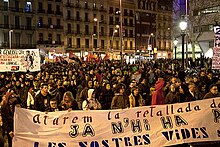
During the rest of the year, the government went on with economic reforms and in January 2011, it agreed to raise the retirement age from 65 to 67 after reaching an agreement with the main trade unions. Despite that, anarcho-syndicalist unions and other minors ones rejected the plan and called for a strike on January 27 in Galicia, Catalonia and the Basque Country. Demonstrations were also held in Madrid and ended up in clashes.[15][16] The raise was also rejected by the majority of Spaniards.[17]
Although not related to economics, Spanish media have reported the pass in February of the so-called Sinde law, an anti-internet download law which allows for a judicial order to close down any web page which shows links to illegal or illegal downloads of copyright content, as one of the reasons that led to the protests. The law, approved by PSOE, PP and Convergence and Union, has been heavily criticized in Spanish forums and social networks and after the pass an anonymous campaign called #nolesvotes appeared on the Internet, calling on refusing to vote any of the parties that passed the law.[18]
Organising the protests
On January 2011, the digital platform Democracia real YA was created on Spanish social networks and forums.[19] With the support of organisations such as ATTAC, Intermon Oxfam, Ecologists in Action or Youth without Future (Spanish: Juventud Sin Futuro), and using Twitter and Facebook it called "the unemployed, poorly paid, the subcontractors, the precarious, young people..." to take the streets on 15 May in the following places (in alphabetical order): A Coruña, Albacete, Algeciras, Alicante, Almería, Arcos de la Frontera, Badajoz, Barcelona, Bilbao, Burgos, Cáceres, Cadiz, Castellón, Ciudad Real, Córdoba, Cuenca, Ferrol, Figueres, Fuengirola, Granada, Guadalajara, Huelva, Jaén, Lanzarote, La Palma, León, Las Palmas de Gran Canaria, Lleida, Logroño, Lugo, Madrid, Málaga, Menorca, Mérida, Monforte de Lemos, Murcia, Ourense, Oviedo, Palma, Pamplona, Plasencia, Ponferrada, Puertollano, Salamanca, San Sebastián, Santa Cruz de Tenerife, Santander, Santiago de Compostela, Seville, Soria, Tarragona, Toledo, Torrevieja, Ubrique, Valencia, Valladolid, Vigo, Vitoria and Zaragoza.[4] That same day, small demonstrations in support of the Spanish ones were organised in Dublin, Lisbon, Amsterdam, Istanbul, Bologna, London and Paris.
Before the demonstrations, Democracia real YA staged several symbolic events, such as the occupation of a bank in Murcia on 13 May.[20] At the time of the demonstrations, the Democracia real YA website had the support of over 500 diverse associations, whilst continuing to reject any collaboration from any political party or labour union, defending the protests’ independence from all institutionalised political ideology.
Protests
May
15 May
The first protest was called under the motto "we are not goods in the hands of politicians and bankers" and was focused on opposition to what the protesters called "antisocial means in the hands of bankers", partly referring to the changes made in 2010 to contain the ongoing European sovereign debt crisis through bailout of the banks, which the Spanish society saw as responsible for the crisis, while at the same time the government kept announcing social program cutbacks. Protesters also demanded more democracy, a new electoral law and end to political corruption as well as other claims, such as banks nationalisation.
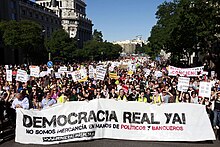
Protests took place in all the planned cities and only in Madrid it gathered 50,000 people according to Democracia real YA, while 20,000 according to the National Police.[21] The march started in Plaza de Cibeles and ended in Puerta del Sol, where several manifestos were read. Also according to the organisers, 15,000 gathered in the demonstration in Barcelona, which ended in front of the Parliament of Catalonia. In other cities such as Granada, up to 5,000 protesters showed up and the protest took place without incident, except for an exchange of insults between some protesters and members of the Fraternity of the Virgin of Rosario, whose procession overlapped with the end of the protest after the latter had gone on longer than expected. In Santiago de Compostela, a group of eight hooded people smashed several banks and local businesses.[22] [23][24] It is estimated that the protesters that day were followed by about 130,000 people throughout Spain.[25]
At the end of Madrid's demonstration, protesters blocked the Gran Vía avenue and staged a peaceful sit-in in Callao street, to which police responded beating protesters with truncheons.[citation needed] As a result of the clashes and the following riots, several shop windows were destroyed and trash containers burnt. 24 people were arrested and five police officers injured.[26] On 17 May, Democracia real YA condemned the "brutal police repression" and rejected having any relation with the incidents.[25] After the incidents, a group of 100 people headed to Puerta del Sol and started the camping in the middle of the square, what would result in the following day's protests.[27]
16 May
During the day, several people gathered in Puerta del Sol and decided to stay in the square until the elections on 22 May. Meanwhile, 200 people started a similar action in Barcelona's Plaça Catalunya, although police had first tried to disperse the crowds. That day the tag #spanishrevolution, as well as other ones related to the protests, became a trending topic in the social-network Twitter.[27]
17 May
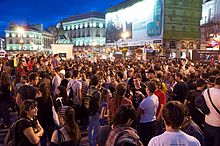
Large groups of demonstrators returned to protest in various cities, standing apart from the group in Madrid in Puerta del Sol. This time the protests were not called together by ¡Democracia Real Ya!.[28] In a few cities, the police permitted the protesters to camp out, as took place in A Coruña, where more than 1,000 people arrived on 15 May.[29] In Madrid, about 200 protesters organized into an assembly, during which they decided to organize themselves for spending the night in Plaza del Sol, creating cleaning, communication, extension, materials and legal committees. Previously they had received a great deal of help from small businesses in the form of food.[30][31] In the evening more than 12,000 people were gathered there.[28]
Protests and nighttime camp-outs took place in 30 cities.[32] The protests gained the support of people in the United Kingdom, who announced that they would sit outside of the Spanish embassy from 18 until 22 May.[32] The protest in Plaza del Sol on the night of the 17 May consisted of about 4,000 people according to the authorities. 300 of them stayed until the dawn of 18 May.[31]
18 May

In Madrid, the protesters put up a large tarp canopy beneath which they passed out signs with the intention of spending the night there between the 17 and 18 May. According to a reporter from El País, many of them wore carnations, much as took place during the Portuguese Carnation Revolution. In addition, they organized a food stand which provided food donated by local businesses and set up a webcam to provide news from Plaza del Sol through the website Ustream.tv. The protesters were advised not to drink alcohol or to organize into groups of more than 20 people, as these acts could provoke a legal police crackdown.
The police ordered protesters to disperse in Valencia, Tenerife and Las Palmas. During the evacuation of the Plaza del Carmen in Granada there were 3 arrests.[31][33][34] Speeches continued on throughout the afternoon. The protests grew to include León, Seville, where a camp out started as of 19 May,[31] and in other provincial capitals and cities of Spain. Support groups were created on social networks for each camp out through the social network Twitter and other national and international networks. Google Docs and other servers began to receive download requests for documents needed to legally request permission for new protests.
In the morning, the Federación de Asociaciones de Vecinos de Barcelona (FAVB) announced their support of the protests in Barcelona.[35] In Madrid, an activist created a flag that depicts a sun and a hand over a black background, which serves as an emblem for the protests, according to Belén Hernández at El País.
In addition to The Washington Post, which covered the protests on 15 May, news reports took place on the 18th in various media outlets, among them Le Monde, the most widely circulated newspaper in French, in an article which noted the rarity of such large scale protests in Spain.[36] The German newspaper, Der Spiegel, noted the importance of the effects of what has been called "The Facebook Generation" and the youth on the protests.[37] The Portuguese paper Jornal de Notícias, reported on the protests in Madrid on 18 May as soon as it was known that they had been prohibited.[38] And The New York Times, which cited El País and noted the strong organization of the protesters, particularly the 200 people who had been placed in charge of security and the use of Twitter to ensure dissemination of their message.[39] The Washington Post again reported on the protests in Puerta del Sol, giving them the name of a "revolution" and estimating the presence of 10,000 people on Wednesday afternoon's protest and comparing it with those in Cairo's Tahrir Square, which had recently ousted Egyptian president Hosni Mubarak.[40] The BBC made reference to the peaceful nature of the protests in Puerta del Sol.[6]
The various protests agreed to hold meetings between their organizing committees each day at 1pm and assemblies at 8pm.[41]
In the evening, the President of the Regional Electoral Committee of Madrid issued a statement declaring the protests illegal because "calls for a responsible vote can change the results of the elections".[42] Police units at Sol, however, received orders from the Government Delegation not to take out any further action.[43]
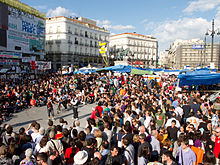
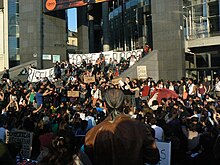
20 May
According to Britain's The Guardian, "tens of thousands" had camped out in Madrid and throughout the country on the night of 19–20 May.[44]
United Left appealed the Electoral Board's decision to ban the protests before Spain's Supreme Court,[45] to which the State Prosecution presented its arguments shortly after.[46]
Appeal before the Supreme Court
Spain's public broadcaster, RTVE reported that the State Prosecutor upheld the decision taken by the Central Electoral Board[47] to ban the rallies.[48] Meanwhile, the police announced that they had been given instructions not to dissolve the crowd at Puerta del Sol provided that there was no disturbance of the peace.[49]
Appeal before the Tribunal Constitucional
RTVE later reported that the country's Constitutional Court had been deliberating since 7.30pm whether to review an appeal against the decision of the Central Electoral Board.[50] At 10.08 pm (local time), RTVE informed that the Constitutional had rejected the appeal on the formality that the appellant had not appealed first to the Supreme Court.[51]
At 22:47 United Left announced it would appeal the Supreme Court's decision before the Tribunal Constitucional. They had until midnight.[52]
At around 23:00, some 16,000 people (according to the police) and 19,000 (according to other sources) were gathered at and around Puerta del Sol.[53]
21 May
In Madrid, Barcelona, Malaga and other cities 21 May started with a minute of silence followed by cheers and applause.[54] Smaller cities, such as Granada, decided to start before midnight to avoid disturbing the neighbors. These protests occurred even though protests on the day before elections are banned.[55]
Around 28,000 people, according to the police, crowded Puerta del Sol and the neighboring streets despite the prohibition. Other cities also gathered large numbers of people: 15,000 in Malaga, 10,000 in Valencia, 6,000 in Zaragoza, 4,000 in Seville, 1,500 in Granada, 800 in Almeria, 600 in Cadiz, 200 in Huelva, around 100 in Jaen. 8,000 people gathered in Barcelona, 1,000 in Vigo, 3,000 in Bilbao, 2,000 in Oviedo, 2,000 in Gijón, around 800 in Avilés, 3,000 in Palma.[54]
There were demonstrations in other European cities, with 300 protesters participating in London, 500 in Amsterdam,[56] 600 in Brussels and 200 in Lisbon. Minor demonstrations occurred in Athens, Milan, Budapest, Tangiers, Paris, Berlin, Vienna and Rome.[54]
22 May
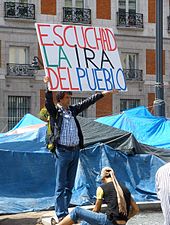
Just after 14:00 on election day, the indignados (the outraged) that had gathered at Puerta del Sol announced they had voted to stay at least another week, until noon on 29 May.[57] Early analysis of the nationwide elections, won by the People's Party, suggested the protest movement could have contributed to losses for the ruling PSOE,[58] and to increased numbers of spoilt or blank votes, which reached record levels.[59]
24 May
In Murcia, some 80 people gained access to the headquarters of the television channel 7 Región de Murcia, avoiding security staff, in order to read a manifesto denouncing media manipulation.[60] Likewise, some 30 people gained unobstructed entry to the Tarragona office of the Ministry of Economy and Finance and shouted slogans against the political and economic systems, before moving to several financial sites in the city centre to do the same.[61]
25 May
In Málaga, the Ministry of Defence decided to relocate various activities for Armed Forces Day planned for Friday 27. Protesters had already been occupying the Plaza de la Constitución, where the events were scheduled to take place, for eight days.[62]
27 May

| External videos | |
|---|---|
At approximately 7am on 27 May a more serious incident occurred when the city council of Barcelona decided to send 350 police officers from the Mossos d'Esquadra and another one hundred or so from the Guàrdia Urbana to temporarily vacate Plaça de Catalunya so that it could be cleaned ahead of the final of the Champions League final on 28 May, in which FC Barcelona were playing.[63][64] The resulting violent clash ended in 121 light injuries and provoked new calls to protest in all squares still occupied across Spain.[63][65] The majority of those injured suffered bruises and open wounds caused by police officers' truncheons, and one protester leaving with a broken arm.[65] By shortly after midday those protesters vacated had already returned to the square.[66]
Similar incidents also occurred in Lleida and Sabadell, where Mossos d'Esquadra officers dismantled the protesters' encampments.[63] According to police figures, more than 12,000 people gathered in Barcelona through the course of the day, angry about the earlier actions of the police, painting their hands white and carrying flowers as symbols of protest. They demanded, among other things, the resignation of the head of the Mossos d'Esquadra, Felip Puig. They also claimed that following the incident the encampment would likely not be taken down on Sunday 28, as had previously been stated.[67]
The clearing of the Barcelona camp was broadcast live by two Spanish television channels, including Antena 3, and was also widely dispersed through social networks such as Twitter.[68][69]
The Catalan ombudsman opened an investigation into the incident to check if police action was disproportionate and if it violated citizens' rights.[70]
June
2 June
At least 40 people gathered in Montcada i Reixac, Barcelona and prevented court officials from serving a family with the order to leave their home immediately, and protesting against banks repossessing people's homes.[71]
4 June
Representatives from 53 assemblies around Spain gathered in a mass assembly in Puerta del Sol.[72]
8 June
In Madrid, hundreds of people gathered in front of the Congreso de los Diputados, with a police barrier preventing them from entering the building. Demonstrations in front of the Parliament are banned in Madrid, but the protest finished without incidents.[73] In Valencia, dozens of people decided to stay in front of the regional Parliament.[74] In Barcelona, around 50 people protested outside the Catalan Parliament against Felip Puig.[75]
9 June
In the morning, police clashed with protesters in Valencia, injuring 18.[76] As a response of the police violence, demonstrators called for a protest in the city later that day, which gathered around 2,000 people. Support demonstrations were held in Barcelona and Madrid, the latter ending up in front of the Parliament for a second night.[77][78]
12 June
On Sunday, 12 June, four weeks after the protests had begun, protestors in the Puerta del Sol in Madrid, began to leave, dismantling the "acampada," packing up tents, libraries, shops, and removing protest signs from surrounding sites.[79]
15 June
An estimated 2000 demonstrators assembled in Barcelona at the Catalonian Parliament, resulting in police clashes which injured 36.[80]
Political response
The demonstration triggered reactions from the main political parties, who after debating issued statements on 16 May. On 15 May, the day of the first demonstration, almost every party was willing to be quoted on the situation.[81] Jaime Mayor Oreja, Member of the European Parliament representing the Partido Popular, was critical of the protesters’ alleged intention of not casting ballots on the forthcoming election. So was PSOE member and Minister of Public Works and Transport José Blanco.[82] United Left had a positive view of the protesters’ demands, but admitted not having been capable of connecting to them. The party’s political coordinator Cayo Lara, defended the protesters’ refusal to become a “lost generation” and was critical of their removal from the Puerta del Sol on 16 May.[83] Other politicians, such as José Antonio Griñán, showed sympathy for the protests, while insisting in that not voting is not a solution. Esteban González Pons, general vicesecretary of the Partido Popular linked the demonstrations to the “antisystem far left”.[84]
Former Spanish Prime Minister Felipe González compared the protests, which he considered "an extraordinarily important phenomenon",[85] with those staged in Arab countries,[86] pointing out that "in the Arab world they are demanding the right to vote while here they are saying that voting is pointless".[85]
See also
- Real democracy NOW (Spanish: Democracia real YA)
- Time for Outrage!
- Reacts
- 2011 Greek protests
References
- ^ "Tahrir Square in Madrid: Spain's Lost Generation Finds Its Voice". Spiegel. Retrieved 7 July 2011.
- ^ Rainsford, Sarah. "Youths defiant at 'Spanish revolution' camp in Madrid". BBC News. Retrieved 7 July 2011.
- ^ "Movimiento 15-M: los ciudadanos exigen reconstruir la política (15-M Movement: citizens demand political reconstruction)". Politica.elpais.com. 2011-05-17. Retrieved 2011-05-22.
- ^ a b ¡Democracia Real Ya!; Calls Cite error: The named reference "democraciarealya" was defined multiple times with different content (see the help page).
- ^ a b "Indignados en la calle". EL PAÍS. 2011-05-17. Retrieved 2011-05-22.
- ^ a b "BBC News - Spanish youth rally in Madrid echoes Egypt protests". Bbc.co.uk. 2011-05-18. Retrieved 2011-05-22.
- ^ "Στα χνάρια των Ισπανών αγανακτισμένων (On the footsteps of the Spanish 'indignados')" (in Greek). www.skai.gr. 26 May 2011. Retrieved 26 May 2011.
- ^ ""Geração à rasca" é referência para Espanha - JN". Retrieved 2011-05-22.
- ^ "Los sábados de Islandia llegaron al 15-M (Icelandic saturdays appear on 15-M)". Politica.elpais.com. 2011-05-17. Retrieved 2011-05-22.
- ^ "Miles de personas exigen dejar de ser 'mercancías de políticos y banqueros'". El Mundo. Retrieved 7 July 2011.
{{cite news}}:|first=missing|last=(help) - ^ "La manifestación de 'indignados' reúne a varios miles de personas en toda España (''Outraged'' demonstration brings together several thousand people in Spain)". Elpais.com. Retrieved 2011-05-22.
- ^ "Unemployment in Spain rises sharply to 21.3 percent". Eitb. Retrieved 30 May 2011.
- ^ "El desempleo juvenil alcanza en España su mayor tasa en 16 años". La Voz de Galicia. Retrieved 30 May 2011.
- ^ "Spain overhauls labour market, as unions plan general strike". Yahoo. Retrieved 30 May 2011.
- ^ "Spain retirement age going to 67 in austerity push". Deseret News. Retrieved 30 May 2011.
- ^ "Hoy huelga en Euskadi, Navarra, Galicia y Catalunya". Público. Retrieved 30 May 2011.
- ^ "Un 79% de los españoles, en contra del retraso de la jubilación a los 67 años". El Mundo. Retrieved 30 May 2011.
- ^ "Congress has given the definitive approval to the Law Sinde". Spain Review. Retrieved 30 May 2011.
- ^ "El 15 -M sacude el sistema". El País. Retrieved 26 May 2011.
- ^ "La Plataforma 15M ocupa una oficina del Banco Santander". Tercera Información. Retrieved 30 May 2011.
- ^ "Comunicado de prensa de "Democracia Real Ya"". Democraciarealya.es. Retrieved 2011-05-22.
- ^ "1.000 personas se manifiestan en Compostela reclamando Democracia Real Ya". Retrieved 7 July 2011.
- ^ Juan Enrique Gómez. "5.000 personas toman las calles de Granada para exigir "democracia real, ya"". Ideal.es. Retrieved 2011-05-22.
- ^ "Democracia Real Ya: Bronca al cruzarse con la procesión de la Virgen del Rosario. Ideal". Ideal.es. Retrieved 2011-05-22.
- ^ a b "Comunicado de Democracia real YA". insurgente.org. Retrieved 2 June 2011.
- ^ "24 detenidos y cinco policías heridos en la protesta antisistema de Madrid". El Mundo. Retrieved 2 June 2011.
- ^ a b "http://www.elmundo.es/elmundo/2011/05/16/madrid/1305541852.html". El Mundo. Retrieved 2 June 2011.
{{cite news}}: External link in|title= - ^ a b El Diario Montañés; Miles de 'indignados' vuelven a tomar la Puerta del Sol, 17 de mayo de 2011 (consultado el mismo día)
- ^ La Voz de Galicia; Varias acampadas reavivan las movilizaciones de «indignados» en Galicia, 17 de mayo de 2011 (consultado el mismo día).
- ^ Pérez-Lanzac, Carmen, de El País; Indignados y acampados, 17 de mayo de 2011 (consultado el mismo día).
- ^ a b c d Muñoz Lara, Aurora, de El País; El movimiento 15-M abarrota Sol, 18 de mayo de 2011 (consultado el mismo día).
- ^ a b El Mundo; Acampadas en cadena hasta el próximo 22-M, 17 de mayo de 2011 (consultado el mismo día).
- ^ Ideal.es; La Policía Nacional retira a los 'indignados' acampados en la Plaza del Carmen de Granada (consultado el 18 de mayo de 2011).
- ^ Ideal.es; Tres 'indignados' detenidos tras el desalojo en la Plaza del Carmen de Granada (consultado el 18 de mayo de 2011).
- ^ Federación de Asociaciones de Vecinos de Barcelona (en catalán); La Favb crida a recolzar l'acampada de plaça Catalunya, 18 de mayo de 2011 (consultado el mismo día).
- ^ Le Monde (en francés); Les jeunes Espagnols dans la rue pour clamer leur ras-le-bol, 18 de mayo de 2011 (consultado el mismo día).
- ^ Der Spiegel (en alemán); Job-Misere treibt Spaniens Jugend auf die Straße, 18 de mayo de 2011 (consultado el mismo día).
- ^ Jornal de Notícias (en portugués); Manifestação proibida no centro de Madrid, 18 de mayo de 2011 (consultado el mismo día).
- ^ The New York Times (en inglés); Protesters Rally in Madrid Despite Ban, 18 de mayo de 2011 (consultado el 19 de mayo de 2011).
- ^ Flock, Elizabeth (2011-05-18). "Spanish 'revolution': Thousands gather in Madrid's Puerta del Sol Square". The Washington Post. Retrieved 2011-05-22.
- ^ El País; Un ágora instalado en el kilómetro 0, 18 de mayo de 2011 (consultado el mismo día).
- ^ Elpais.es; Acuerdo de la Junta Electoral Provincial de Madrid
- ^ "La Policía tiene la orden de no desalojar Sol - 3080803 - EcoDiario.es". Ecodiario.eleconomista.es. 2011-05-18. Retrieved 2011-05-22.
- ^ Giles Tremlett in Madrid. "Spain bans young protesters ahead of elections". The Guardian. Retrieved 2011-05-22.
- ^ IU ha presentado ante el Tribunal Supremo un recurso contra la decisión de la Junta Electoral Central, 20 de mayo de 2011 (consultado el mismo día).
- ^ El País; El Supremo delibera sobre el recurso de IU, al que se opone la Fiscalía, 20 de mayo de 2011 (consultado el mismo día).
- ^ RTVE.es "La Fiscalía respalda la decisión de la JEC de prohibir las movilizaciones el sábado y el domingo" Retrieved 2011-05-20
- ^ Documento oficial de la desestimación del recurso presentado por Izquierda Unida, 20 de mayo de 2011] Retrieved 2011-05-20
- ^ Europa Press; La Policía no desalojará la Puerta del Sol mientras no haya incidentes, 20 de mayo de 2011] Retrieved 2011-05-20
- ^ "Sala Segunda del Constitucional estudia desde las 19.30 hora peninsular si admite a trámite el recurso de amparo interpuesto por un abogado de Murcia contra la decisión de la JEC." Retrieved 2011-05-20
- ^ 22.08 "El Tribunal Constitucional rechaza admitir el recurso del abogado de Murcia porque no ha agotado todas las vías. Retrieved 2011-05-20
- ^ RTVE: 22.47 Izquierda Unida presentará antes de la medianoche un recurso de amparo ante el Tribunal Constitucional Retrieved 2011-05-20
- ^ RTVE.es - MADRID (2011-05-18). "Minuto a minuto: Los acampados debaten hoy el futuro del movimiento 15M tras las elecciones". RTVE.es. Retrieved 2011-05-22.
{{cite web}}: CS1 maint: extra punctuation (link) - ^ a b c "El movimiento 15-M acampará una semana más en Sol | Política | EL PAÍS". Politica.elpais.com. Retrieved 2011-05-22.
- ^ "Thousand Defy Protest Ban to Rally Ahead of Spanish Elections". Voice of America. 21 May 2011. Retrieved 21 May 2011.
- ^ [1].
- ^ RTVE: 'Los "indignados" de Sol deciden mantener las protestas al menos una semana más' Retrieved 2011-05-22
- ^ Yahoo! Noticias; Sociólogos califican 22-M de 'tsunami' pero no de ensayo general, 23 May 2011 (accessed the same day).
- ^ El País; Aumentan el voto en blanco y nulo en más de un punto, 23 May 2011 (accessed the same day).
- ^ "AMP.- 15M.- Un centenar de 'indignados' entran la sede de la TV murciana para leer un manifiesto". Europa Press. 24 de mayo de 2011. Retrieved 26 May 2011.
{{cite news}}: Check date values in:|date=(help) - ^ "Una treintena de 'indignados' irrumpen en la delegación de Hacienda de Tarragona". Diari de Tarragona. 24 May 2011. Retrieved 26 May 2011.
- ^ Defensa cambia de ubicación varios actos del Día de las Fuerzas Armadas por el 15-M, Cadena SER
- ^ a b c "El Govern defiende la carga y la actuación de los Mossos". La nueva España. 27 May 2011. Retrieved 28 May 2011.
- ^ Rainsford, Sarah (28 May 2011). "Anger as Spanish police move on Barcelona protest camp". BBC. Retrieved 29 May 2011.
- ^ a b The Washington Post; Scores injured as Spanish police clash with protesters in makeshift camp, 27 May 2011 (accessed the same day).
- ^ El País; Los 'indignados' recuperan la plaza de Catalunya tras la retirada de la policía, 27 May 2011 (accessed the same day).
- ^ El Mundo; La dureza policial multiplica la indignación en Barcelona, 28 May 2011 (accessed the same day).
- ^ "Antena 3 se impone en la cobertura del desalojo de 'indignados' en Barcelona por los Mossos". Europa Press. 27 May 2011. Retrieved 28 May 2011.
- ^ Silicon News. 27 May 2011 http://www.siliconnews.es/2011/05/27/bcnsinmiedo-lidera-la-lista-de-trending-topics-mundial/. Retrieved 28 May 2011.
{{cite news}}: Missing or empty|title=(help); Unknown parameter|título=ignored (|title=suggested) (help) - ^ El Mundo; El defensor del pueblo catalán investiga si los Mossos iban bien identificados en el desalojo, 27 May 2011 (accessed the same day).
- ^ "Aplazan el segundo intento de desahuciar a una familia". El Mundo. Retrieved 14 July 2011.
- ^ [Aplazan el segundo intento de desahuciar a una familia "Asamblea nacional de 'indignados' en el kilómetro cero"]. El Mundo. Retrieved 14 July 2011.
{{cite news}}: Check|url=value (help) - ^ "Spanish youths take anti-crisis protests to parliament". AFP. AFP. Retrieved 8 June 2011.
- ^ "Diario de una revolución en Valencia: Centenares de indignados pasan la noche frente al Parlamento valenciano". El Periodico de Aqui. El Periodico de Aqui. Retrieved 8 June 2011.
- ^ "Medio centenar de personas exigen ante el Parlament la dimisión de Puig". El Mundo. Retrieved 13 June 2011.
- ^ "18 injured as Spanish protesters clash with police", Channel 6 News. 9 June 2011. Accessed 11 June 2011
- ^ "'Indignados' de Barcelona protestan ante la sede del PP por las cargas de Valencia". El Mundo. Retrieved 13 June 2011.
- ^ "Los 'indignados' abandonan la protesta frente al Congreso". El Mundo. Retrieved 13 June 2011.
- ^ http://www.elpais.com/articulo/espana/indignados/movimiento/15-M/levantan/lema/nos/vamos/nos/expandimos/elpepuesp/20110612elpepunac_1/Tes "Los indignados del movimiento 15-M se levantan bajo el lema "No nos vamos, nos expandimos", El País, 12 June 2011. Accessed 12 June 2011
- ^ "Dozens injured during 15-M protest in Barcelona", Channel 6 News. 15 June 2011. Accessed 15 June 2011
- ^ Ríos, Sara, de 20minutos; La mayoría de partidos miran para el otro lado y evitan pronunciarse sobre las protestas, 16 de mayo de 2011 (consultado el 28 de mayo de 2011).
- ^ ""Democracia real ya" hace reaccionar a los dos principales partidos". Lavozdegalicia.es. Retrieved 2011-05-22.
- ^ La Voz de Galicia; Cayo Lara: «Zapatero ha traído más beneficios para los amos y la porra para los de abajo», 17 de mayo de 2011 (consultado el mismo día).
- ^ "González Pons vincula a parte de 'Democracia Real Ya' con la "extrema izquierda del PSOE"". 20minutos.es. 2011-05-17. Retrieved 2011-05-22.
- ^ a b Ideal.es; Felipe González, sobre los 'indignados': "Están hartos, los partidos no deberían descalificarlos" 17 de mayo de 2011 Retrieved 2011-05-17.
- ^ Ideal.es; Felipe González compara a los 'indignados' con los protagonistas de las revueltas árabes 18 de mayo de 2011. Retrieved 2011-05-18.
External links
- Official blog
- SolTV (live streaming)
- RTVE (Spanish public broadcaster) Webcam: El 15M mantiene el pulso y convoca una concentración el sábado RTVE Webcam over Puerta del Sol (live)
- ¡Democracia real Ya! Official Web
- Brochure protests convened on June 19
- Article on the Spanish protests by Peter Gelderloos
- Timeline, political analysis, and eyewitness reportage of the Spanish protests on crimethinc
